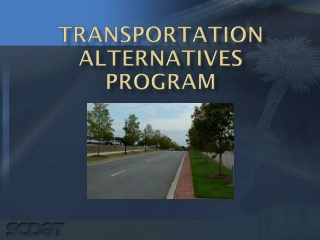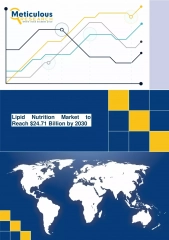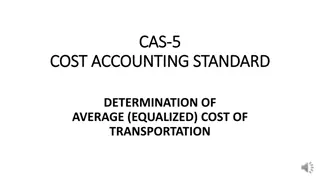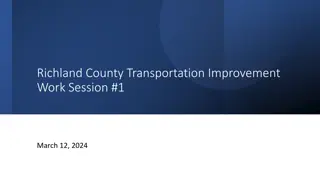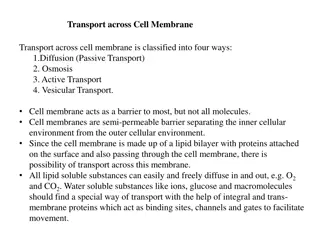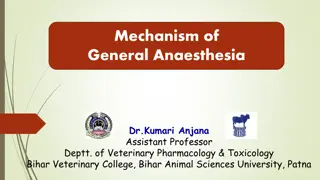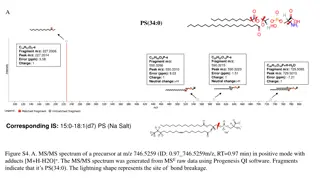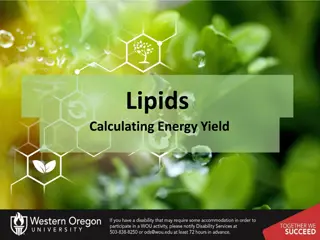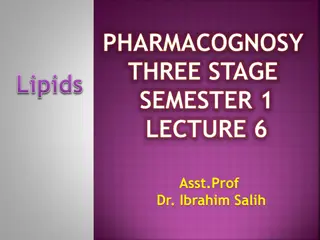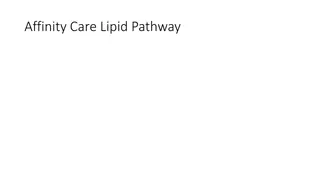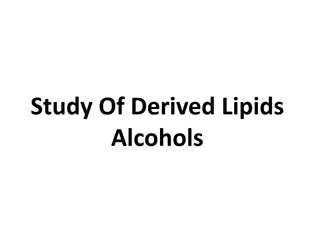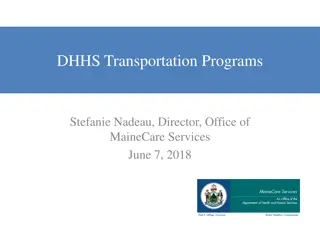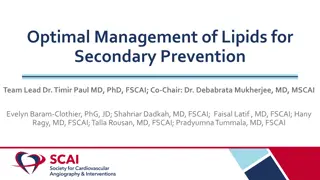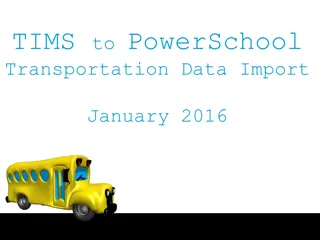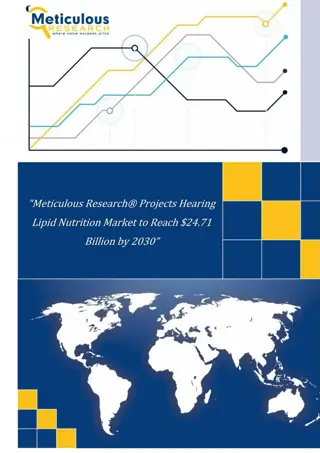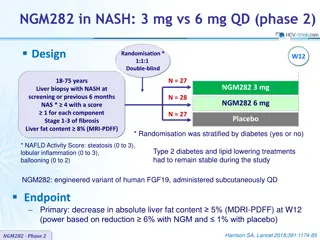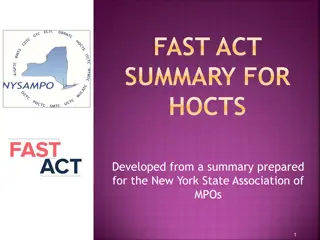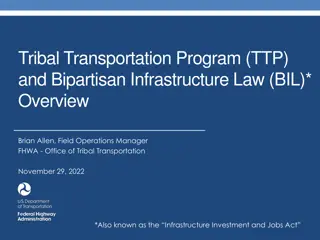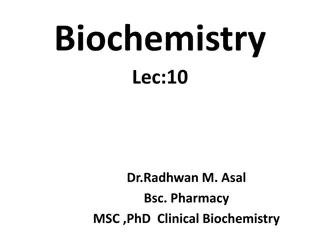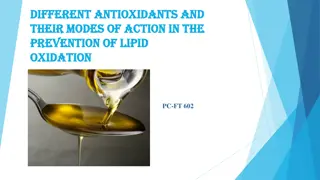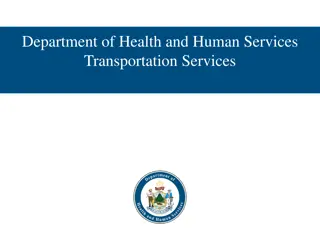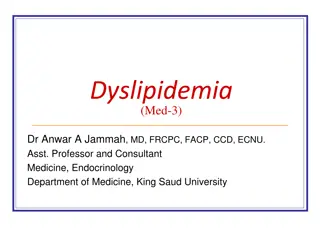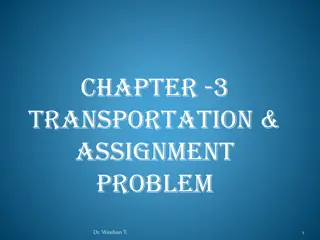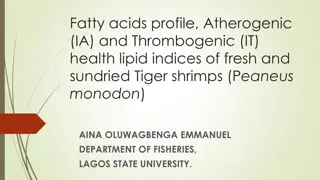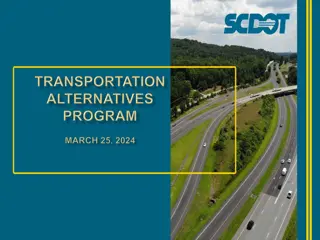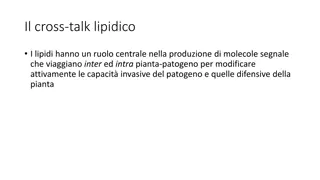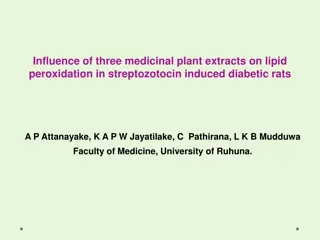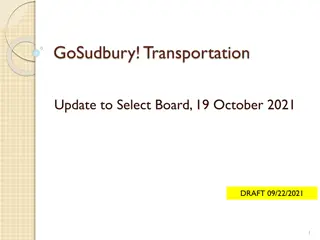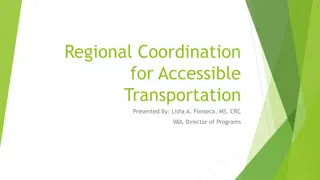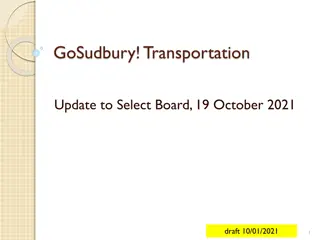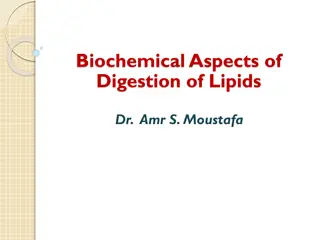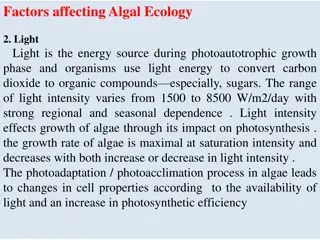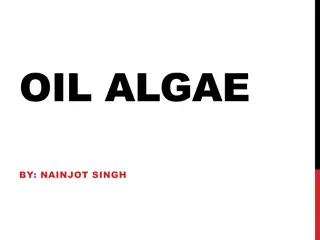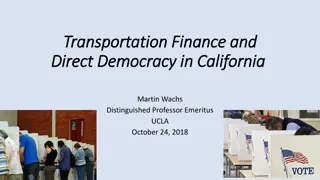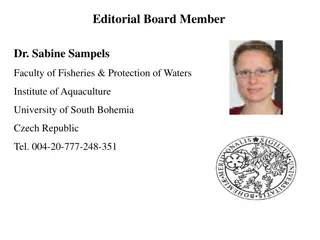Funding Opportunities for Non-Motorized Transportation in South Carolina
The US Department of Transportation's Federal Highway Administration provides funding to South Carolina through the Transportation Alternatives Program (TAP) to support non-motorized transportation initiatives. Local governments, schools, and other entities can partner with the South Carolina Depart
1 views • 21 slides
Lipid Nutrition Market to Reach $24.71 Billion by 2030
Lipid Nutrition Market by Type (Omega-3, Medium Chain Triglycerides (MCT), Omega-6, Omega-9) Source (Marine, Plant), Form (Liquid, Dry), Application (Dietary Supplements, Food & Beverages, Pharmaceuticals, Animal Feed) - Global Forecast to 2030
1 views • 3 slides
Cost Accounting Standards for Determining Transportation Costs
Understanding the importance of transportation costs in procurement and distribution, this guide outlines the standards for determining average costs, separation of transportation costs in accounting records, objectives for maintaining cost uniformity, components of transportation costs, and treatme
0 views • 11 slides
Understanding Transportation Programs and Trends
Transportation training session led by Megan Johnson, featuring topics such as Transportation Crash Course, Training Opportunities, and Transportation Trends & Updates. Includes discussions on different types of transportation services and their importance for communities.
2 views • 38 slides
Lipid Nutrition Market to Reach $24.71 Billion by 2030
Key Questions Addressed:\n\nWhat is the current market value of the global lipid nutrition market?\nWhat is the projected growth rate of the lipid nutrition market for the next 5\u20137 years?\nWhat are the historical market sizes and growth rates?\nWhat are the major factors influencing market grow
4 views • 4 slides
Richland County Transportation Improvement Summary
Richland County's transportation improvement work includes sessions on project principles, funding options, project costs, and guidelines for utilizing the transportation penny. The focus is on addressing transportation needs, project prioritization, funding challenges, and division of funds for var
0 views • 19 slides
Understanding Cell Membrane Transport: Diffusion and Facilitated Diffusion
Cell membrane transport plays a crucial role in maintaining cellular functions by regulating the movement of substances across the membrane. Diffusion, a passive transport process, allows molecules to move from areas of high concentration to low concentration without energy expenditure. Within diffu
2 views • 20 slides
Overview of Lipids: Classification and Biological Importance
Lipids are organic substances that play a crucial role in biological systems. They include simple lipids, complex lipids like phospholipids and glycolipids, and derived lipids. Simple lipids are esters of fatty acids with various alcohols, while complex lipids are sub-classified based on the type of
2 views • 38 slides
Mechanism of General Anaesthesia Theories: Lipid Solubility, Surface Tension, Microcrystal, Protein Binding
Mechanism of general anaesthesia involves theories focusing on the interaction of anaesthetics with cell membrane components like lipids and proteins. The Lipid Solubility theory emphasizes the importance of an anaesthetic's affinity and solubility in nerve cell membranes, while the Surface Tension
1 views • 10 slides
Mass Spectrometry Analysis of Lipid Species
Detailed mass spectrometry data for various lipid species including APS(34:0), PI(O-36:1), C24(OH) Sulfatide, and PE(O-33:0) is provided in positive mode with corresponding adducts and neutral changes. The MS/MS spectra reveal fragment ions and structural information for each lipid species, aiding i
1 views • 4 slides
Understanding Lipids: Importance, Digestion, and Absorption
Professor Shraddha Singh's lecture series delves into the significance of lipids, the types of lipids, and the role of bile in digestion. Learn about saturated vs. unsaturated fatty acids, common fatty acids found in lipids, lipid structures, and properties. Explore the diverse types of fats we cons
2 views • 32 slides
Energy Yield from Lipid Oxidation Process
Understanding the energy generation process from lipid oxidation involves the conversion of fatty acids into Acetyl-CoA through multiple rounds of oxidation, which then enter the Krebs cycle to produce ATP. Each round of oxidation results in the production of Acetyl-CoA, NADH, FADH2, and net gains o
0 views • 7 slides
Introduction to Lipid Biosynthesis and Fixed Oils in Pharmacognosy Lecture
In this lecture by Asst. Prof. Dr. Ibrahim Salih, the focus is on lipid biosynthesis, specifically the three phases involved: glycerol formation, fatty acid biosynthesis, and triglyceride production. The classification of fixed oils into drying, semi-drying, and non-drying categories based on their
0 views • 13 slides
Affinity Care Lipid Pathway Summary and Assessment
The Affinity Care Lipid Pathway outlines a systematic approach to assessing lipid/cholesterol blood results in individuals over 16 years old. It includes guidelines for managing cholesterol levels, assessing familial hypercholesterolemia, and determining appropriate medication options based on indiv
0 views • 5 slides
Exploring Alcohols in Lipid Structures and Their Importance
Delve into the world of derived lipids alcohols, such as glycerol, sphingosine, and cholesterol, which play vital roles in various forms of lipids. Learn about the classification of alcohols involved in lipid structures and their significance as derived lipids. Discover how glycerol, a polyol, acts
0 views • 67 slides
Understanding Lipid Compounds and Their Physiological Significance
Explore the world of lipid compounds and their vital roles in the body, including serving as a major energy source, structural components of cell membranes, and key regulatory molecules. Learn about various types of lipids, such as fatty acids, phospholipids, and lipoproteins, and their relevance to
0 views • 24 slides
Maine DHHS Transportation Programs Overview
The Maine Department of Health and Human Services (DHHS) oversees various transportation programs aimed at providing non-emergency transportation services to low-income, child welfare-eligible, and Section 17-eligible individuals. These programs are managed through regional brokerage systems, with b
3 views • 5 slides
Optimal Management of Lipids for Secondary Prevention Team Study
Lipid management in secondary prevention plays a crucial role in reducing cardiovascular risk. This study led by Dr. Timir Paul aims to address system-level gaps in care, enhance communication for optimal therapy, and empower patients in achieving target lipid levels. By recognizing disparities and
0 views • 28 slides
Importing TIMS Transportation Data into PowerSchool
Explore the process of extracting, formatting, purging, and importing TIMS transportation data into PowerSchool for efficient management of student transportation information. This includes creating TIMS extracts, updating bus stop information, and optimizing transportation planning through geocodin
2 views • 43 slides
Lipid Nutrition Market by Size, Share, Forecast, & Trends Analysis to 2030
According to the latest report from Meticulous Research\u00ae, the global lipid nutrition market is anticipated to reach $24.71 billion by 2030, with a compound annual growth rate (CAGR) of 8.9% from 2023 to 2030. This growth is primarily driven by r
0 views • 4 slides
NGM282 in NASH Phase 2: 3 mg vs 6 mg QD Randomised Trial
This Phase 2 clinical trial compares the efficacy of NGM282 (3 mg vs 6 mg) versus placebo in patients with NASH. The primary endpoint is a 5% reduction in liver fat content at 12 weeks. Randomisation was stratified by diabetes status, and stable Type 2 diabetes and lipid-lowering treatments were mai
0 views • 6 slides
Overview of FAST Act for Transportation Planning
The FAST Act, passed in 2015, authorizes federal programs for transportation development with a focus on surface transportation. It extends funding through 2020, totaling $304.7 billion. The Act aims to enhance resiliency, reliability, and stormwater mitigation in transportation systems. Planning fa
2 views • 10 slides
Tribal Transportation Program & Bipartisan Infrastructure Law Overview
The Tribal Transportation Program (TTP) and Bipartisan Infrastructure Law (BIL) provide funding for essential transportation projects in Tribal communities. The TTP Bridge Fund, Safety Fund, and High Priority Projects aim to improve infrastructure and safety. The BIL funding for FY22-FY26 totals $3.
1 views • 13 slides
Understanding Lipid Biochemistry: A Comprehensive Overview
Lipids are a diverse group of compounds crucial for various biological functions. They include fats, oils, steroids, and waxes with unique properties essential for energy storage, insulation, and nerve function. Knowledge of lipid biochemistry is pivotal in understanding areas like obesity, diabetes
0 views • 38 slides
Understanding Antioxidants and Their Role in Preventing Lipid Oxidation
Lipid oxidation is a crucial chemical process affecting the quality of fats and oils, leading to off-flavors and toxicity. Antioxidants play a vital role in delaying this oxidation process by scavenging free radicals through mechanisms like free radical scavenging. They help prolong the shelf life a
0 views • 12 slides
DHHS Coordination of Transportation Service Contracts Overview
The Department of Health and Human Services in Maine conducted an assessment of Transportation Services in June 2019. The workgroup identified three main priorities: alignment of Quality and Performance Measures, Safety Measures, and Evaluation of Transportation Services. The first priority involves
0 views • 28 slides
Understanding Dyslipidemia and Lipid Transport in Atherosclerosis
Dyslipidemia is characterized by abnormal levels of lipids in the blood, leading to atherosclerosis. Lipid transport mechanisms play a crucial role in the formation and progression of atheromas in artery walls. Chylomicrons carry fats from the intestine to the liver, where they are processed into LD
0 views • 54 slides
Understanding Transportation and Assignment Problem
Transportation and assignment problems involve optimizing the shipment of goods from various sources to multiple destinations while minimizing total transportation costs. These problems deal with limited supply, known demand, constant shipping costs, and integer quantities. The transportation algori
0 views • 64 slides
Fatty Acids Profile and Health Lipid Indices of Tiger Shrimps
Seafood lipids, including Tiger shrimps like Peaneus monodon, are rich in essential fatty acids such as EPA, DHA, and AA. This study focuses on the fatty acids profile, atherogenic (IA), and thrombogenic (IT) health lipid indices of fresh and sundried Tiger shrimps, shedding light on the effects of
0 views • 19 slides
Enhancing Transportation Infrastructure Through Federal Funding Programs
The Transportation Alternatives Program (TAP) funded by the USDOT's Federal Highway Administration supports transportation projects in South Carolina based on population categories. TAP funds are allocated to Transportation Management Areas (TMAs), Small Urban Areas, and Non-Urban Areas, prioritizin
0 views • 21 slides
Role of Lipids in Plant-Pathogen Interaction
Lipids play a central role in signal molecule production for actively modifying the invasive capabilities of pathogens and the defensive mechanisms of plants during inter and intra-plant-pathogen interactions. They are essential constituents of membranes, providing structural support and serving div
0 views • 43 slides
Influence of Medicinal Plant Extracts on Lipid Peroxidation in Diabetic Rats
Traditional medicinal plant knowledge plays a crucial role in diabetes treatment. Free radicals and oxidative stress are key factors in diabetic complications. This study investigates the effects of three plant extracts on lipid peroxidation in diabetic rats, highlighting the potential benefits of n
0 views • 20 slides
Addressing Transportation Gaps in Sudbury: A Livable Community Approach
The Sudbury Transportation Committee, established by the Select Board, aims to enhance transportation in Sudbury to create a livable community. Focusing on inclusivity, equity, and addressing transportation gaps impacting various aspects of livability, the initiative seeks to improve social particip
0 views • 16 slides
Understanding Regional Coordination for Accessible Transportation
This presentation delves into the concept of regional coordination in accessible transportation, focusing on the Regional Transportation Advisory Panel, 5-year regional transportation goals, and the significance of the Safe, Accountable, Flexible, Efficient Transportation Equity Act. It emphasizes t
0 views • 16 slides
Enhancing Livability in Sudbury Through Transportation Initiatives
The GoSudbury! Transportation Update to the Select Board on October 19, 2021 highlights the importance of addressing transportation as a key component of livable communities. The initiative aims to create a safe, secure, and inclusive environment by improving transportation options for residents of
0 views • 26 slides
Biochemical Aspects of Lipid Digestion by Dr. Amr S. Moustafa
This lecture by Dr. Amr S. Moustafa covers the biochemical aspects of lipid digestion, including the process, organs involved, enzymes required, and end products. It discusses the assembly, metabolism, and fate of chylomicrons, as well as the clinical manifestations of diseases related to defective
0 views • 31 slides
Factors Affecting Algal Ecology: Light Intensity Impacts on Algae Growth and Composition
Light intensity plays a crucial role in the growth and composition of algae. Algae undergo photoadaptation processes to adjust to varying light levels, affecting their photosynthetic efficiency and cellular properties. High light intensity can lead to photoinhibition and changes in cellular composit
0 views • 19 slides
The Future of Algae Fuel: A Promising Solution for America's Energy Needs
Algae biofuel technology is essential for improving fuel sources in America. Algae's high lipid content makes it a pure source of biodiesel, with bio-engineered strains now containing up to 80% lipid. Algae fuel production, while promising, is a tedious and expensive process. Despite the challenges,
0 views • 8 slides
Transportation Finance and Direct Democracy in California
Proposition 6 on November 6th has garnered attention, but voters in multiple states will decide on over 250 transportation ballot measures totaling over $55 billion. California, with a longer history and greater funding needs, has been at the forefront of transportation investments, including the us
0 views • 29 slides
Dr. Sabine Sampels: Research on Aquaculture, Fish Quality, and Human Health
Dr. Sabine Sampels, a member of the Editorial Board at the University of South Bohemia, Czech Republic, specializes in studying the effects of fish consumption on human health, animal nutrition on fish quality, and lipid metabolism. With a background in Food Chemistry and extensive research experien
0 views • 25 slides
